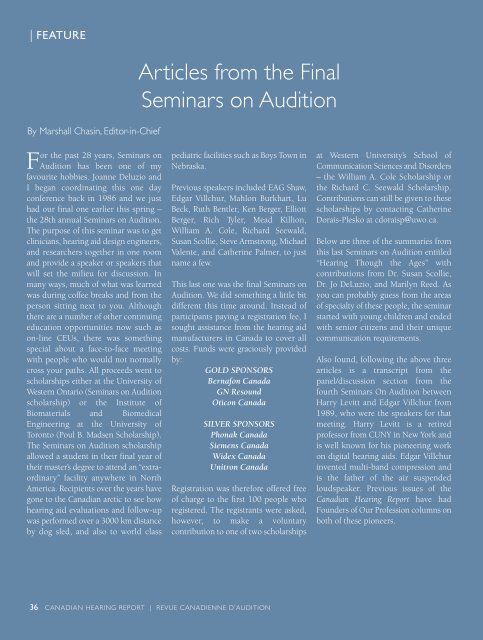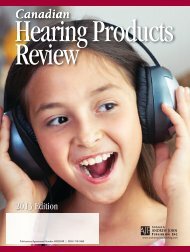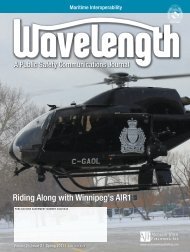Volume 8 Issue 3 (pdf) - Andrew John Publishing Inc
Volume 8 Issue 3 (pdf) - Andrew John Publishing Inc
Volume 8 Issue 3 (pdf) - Andrew John Publishing Inc
Create successful ePaper yourself
Turn your PDF publications into a flip-book with our unique Google optimized e-Paper software.
| feature<br />
Articles from the Final<br />
Seminars on Audition<br />
By Marshall Chasin, Editor-in-Chief<br />
For the past 28 years, Seminars on<br />
Audition has been one of my<br />
favourite hobbies. Joanne Deluzio and<br />
I began coordinating this one day<br />
conference back in 1986 and we just<br />
had our final one earlier this spring –<br />
the 28th annual Seminars on Audition.<br />
The purpose of this seminar was to get<br />
clinicians, hearing aid design engineers,<br />
and researchers together in one room<br />
and provide a speaker or speakers that<br />
will set the milieu for discussion. In<br />
many ways, much of what was learned<br />
was during coffee breaks and from the<br />
person sitting next to you. Although<br />
there are a number of other continuing<br />
education opportunities now such as<br />
on-line CEUs, there was something<br />
special about a face-to-face meeting<br />
with people who would not normally<br />
cross your paths. All proceeds went to<br />
scholarships either at the University of<br />
Western Ontario (Seminars on Audition<br />
scholarship) or the Institute of<br />
Biomaterials and Biomedical<br />
Engineering at the University of<br />
Toronto (Poul B. Madsen Scholarship).<br />
The Seminars on Audition scholarship<br />
allowed a student in their final year of<br />
their master’s degree to attend an “extraordinary”<br />
facility anywhere in North<br />
America. Recipients over the years have<br />
gone to the Canadian arctic to see how<br />
hearing aid evaluations and follow-up<br />
was performed over a 3000 km distance<br />
by dog sled, and also to world class<br />
pediatric facilities such as Boys Town in<br />
Nebraska.<br />
Previous speakers included EAG Shaw,<br />
Edgar Villchur, Mahlon Burkhart, Lu<br />
Beck, Ruth Bentler, Ken Berger, Elliott<br />
Berger, Rich Tyler, Mead Killion,<br />
William A. Cole, Richard Seewald,<br />
Susan Scollie, Steve Armstrong, Michael<br />
Valente, and Catherine Palmer, to just<br />
name a few.<br />
This last one was the final Seminars on<br />
Audition. We did something a little bit<br />
different this time around. Instead of<br />
participants paying a registration fee, I<br />
sought assistance from the hearing aid<br />
manufacturers in Canada to cover all<br />
costs. Funds were graciously provided<br />
by:<br />
GOLD SPONSORS<br />
Bernafon Canada<br />
GN Resound<br />
Oticon Canada<br />
SILVER SPONSORS<br />
Phonak Canada<br />
Siemens Canada<br />
Widex Canada<br />
Unitron Canada<br />
Registration was therefore offered free<br />
of charge to the first 100 people who<br />
registered. The registrants were asked,<br />
however, to make a voluntary<br />
contribution to one of two scholarships<br />
at Western University’s School of<br />
Communication Sciences and Disorders<br />
– the William A. Cole Scholarship or<br />
the Richard C. Seewald Scholarship.<br />
Contributions can still be given to these<br />
scholarships by contacting Catherine<br />
Dorais-Plesko at cdoraisp@uwo.ca.<br />
Below are three of the summaries from<br />
this last Seminars on Audition entitled<br />
“Hearing Though the Ages” with<br />
contributions from Dr. Susan Scollie,<br />
Dr. Jo DeLuzio, and Marilyn Reed. As<br />
you can probably guess from the areas<br />
of specialty of these people, the seminar<br />
started with young children and ended<br />
with senior citizens and their unique<br />
communication requirements.<br />
Also found, following the above three<br />
articles is a transcript from the<br />
panel/discussion section from the<br />
fourth Seminars On Audition between<br />
Harry Levitt and Edgar Villchur from<br />
1989, who were the speakers for that<br />
meeting. Harry Levitt is a retired<br />
professor from CUNY in New York and<br />
is well known for his pioneering work<br />
on digital hearing aids. Edgar Villchur<br />
invented multi-band compression and<br />
is the father of the air suspended<br />
loudspeaker. Previous issues of the<br />
Canadian Hearing Report have had<br />
Founders of Our Profession columns on<br />
both of these pioneers.<br />
36 CANADIAN HEARING REPORT | REVUE CANADIENNE D’AUDITION






